关于春节习俗的英语素材
春节的习俗英语作文

春节的习俗英语作文精选的春节的习俗英语作文(通用21篇)无论在学习、工作或是生活中,大家对作文都再熟悉不过了吧,作文是从内部言语向外部言语的过渡,即从经过压缩的简要的、自己能明白的语言,向开展的、具有规范语法结构的、能为他人所理解的外部语言形式的转化。
相信写作文是一个让许多人都头痛的问题,下面是小编帮大家整理的精选的春节的习俗英语作文,仅供参考,大家一起来看看吧。
春节的习俗英语作文篇1Speaking of my hometown Spring Festival customs, that is really much! Let me give you stretch.To stick couplets on the Spring Festival:Also treats the Spring Festival couplet, spring stick, couplet, subsidiary, peach wood charms against evil, and so on. Every Chinese New Year in the city or the countryside, every family to select a pair of bright red stick with Spring Festival couplets on the door, add a festive atmosphere for the festival.Stick to everyoneWhile to stick couplets on the Spring Festival, everyone in the door, wall, door head with large and small "f" word.Happy New Year:People wear the most beautiful clothes, dress up as neatly, go out to visit friends and relatives, mutual New Year, good prosperous New Year.My favorite is the New Year's eve.Because I like to listen to the legend, I tell you about!Legend in ancient times, our ancestors suffered one of the most ferocious beast threat. This beast is called "year", it hunt animals for food, in winter, when food is scarce in the mountains,also broke into the village and hunt people and livestock, and the people. And the "year" struggle for many years, people found that afraid of three things, the red color, light and noise. And in the winter the people holding a red colour on a peach wooden board, at the door of the fire pile, all night not sleep at night, tapping. The day night, the "year" broke into the village, see every family has a red and a light of fire, heard the sound of loud, frighten ran back to the mountains, dare not to come out. The night in the past, people congratulate congratulations to each other, all decorated, feasting and drinking to celebrate their victory.How, see our customs here, just know there's not much difference in customs around!参考翻译:说到我家乡的春节习俗,那可真多啊!让我给你细细道来。
春节英语风俗
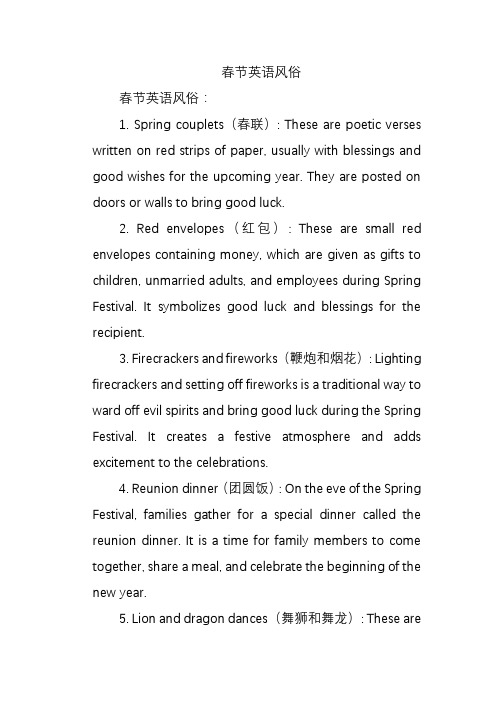
春节英语风俗春节英语风俗:1. Spring couplets(春联): These are poetic verses written on red strips of paper, usually with blessings and good wishes for the upcoming year. They are posted on doors or walls to bring good luck.2. Red envelopes(红包): These are small red envelopes containing money, which are given as gifts to children, unmarried adults, and employees during Spring Festival. It symbolizes good luck and blessings for the recipient.3. Firecrackers and fireworks(鞭炮和烟花): Lighting firecrackers and setting off fireworks is a traditional way to ward off evil spirits and bring good luck during the Spring Festival. It creates a festive atmosphere and adds excitement to the celebrations.4. Reunion dinner(团圆饭): On the eve of the Spring Festival, families gather for a special dinner called the reunion dinner. It is a time for family members to come together, share a meal, and celebrate the beginning of the new year.5. Lion and dragon dances(舞狮和舞龙): These aretraditional performances where dancers dress up as lions or dragons and perform lively dances accompanied by drumming and music. It is believed to bring good luck and drive away evil spirits.6. Temple fairs(庙会): During the Spring Festival, temporary fairs are set up around temples where people can enjoy various activities such as shopping, eating traditional snacks, watching performances, and playing games.。
春节的风俗英语简短句子
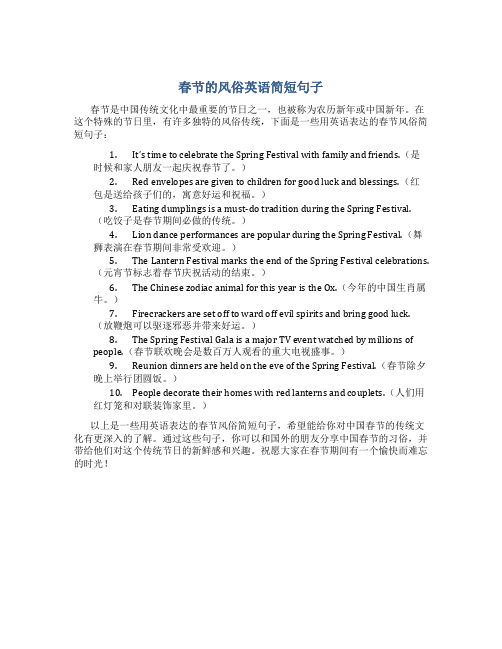
春节的风俗英语简短句子春节是中国传统文化中最重要的节日之一,也被称为农历新年或中国新年。
在这个特殊的节日里,有许多独特的风俗传统,下面是一些用英语表达的春节风俗简短句子:1.It’s time to celebrate the Spring Festival with family and friends.(是时候和家人朋友一起庆祝春节了。
)2.Red envelopes are given to children for good luck and blessings.(红包是送给孩子们的,寓意好运和祝福。
)3.Eating dumplings is a must-do tradition during the Spring Festival.(吃饺子是春节期间必做的传统。
)4.Lion dance performances are popular during the Spring Festival.(舞狮表演在春节期间非常受欢迎。
)5.The Lantern Festival marks the end of the Spring Festival celebrations.(元宵节标志着春节庆祝活动的结束。
)6.The Chinese zodiac animal for this year is the Ox.(今年的中国生肖属牛。
)7.Firecrackers are set off to ward off evil spirits and bring good luck.(放鞭炮可以驱逐邪恶并带来好运。
)8.The Spring Festival Gala is a major TV event watched by millions ofpeople.(春节联欢晚会是数百万人观看的重大电视盛事。
)9.Reunion dinners are held on the eve of the Spring Festival.(春节除夕晚上举行团圆饭。
春节的风俗英语加翻译6到8句

春节的风俗英语加翻译1. 送红包 (Giving Red Envelopes)In the Chinese New Year tradition, elders give red envelopes containing money to children and singles as a symbol of good luck and prosperity.传统中国春节习俗中,长辈们会给孩子和单身者送红包,寓意着好运与繁荣。
2. 吃团圆饭 (Having Reunion Dinner)On the Eve of Chinese New Year, families gather to have a reunion dinner, which symbolizes unity and prosperity for the coming year.在中国新年的前夕,家人聚在一起吃团圆饭,象征着家庭团结和来年的繁荣。
3. 贴春联 (Hanging Spring Couplets)Families hang red spring couplets with auspicious messages on their doors to bring good luck and drive away evil spirits.家庭会在门上贴上红色含吉祥寓意的春联,以带来好运和驱赶邪灵。
4. 看舞龙舞狮 (Watching Dragon and Lion Dances)Dragon and lion dances are performed during the Chinese New Year to bring good luck and prosperity.春节期间会表演舞龙舞狮,以带来好运和繁荣。
5. 放烟花爆竹 (Setting off Fireworks)Setting off fireworks and firecrackers is believed to drive away evil spirits and welcome the new year with a bang.放烟花爆竹被认为可以驱散邪灵,热闹迎接新的一年。
春节习俗英文版带翻译

Family Reunion (团圆)
One of the most important aspects of Chinese New Year is the reunion of family members. Many people travel long distancesto be with their loved ones during this special time. The tradition of family reunion represents the importance of maintaining close relationships and honoring familial ties.
在中国新年期间,人们会放烟花和爆竹来驱赶邪灵,带来好运。巨大的声响和明亮的灯光也被认为能够迎接新的一年,营造节日气氛。
Lucky Money (压岁钱)
Children receive lucky money in red envelopes from their elders as a symbol of good fortune and blessings for the new year. It is a way of passing on good wishes and blessings to the younger generation.
Chinese New Year, also known as the Spring Festival, is the most important and widely celebrated holiday in China. It is a time for families to come together, honor their ancestors, and welcome the arrival of the new year. The festival is rich in traditions and customs that have been passed down through generations. In this article, we will explore some of the most popular Chinese New Year customs and their significance.
春节习俗英文介绍

春节习俗英⽂介绍春节习俗英⽂介绍 习俗即是习惯。
在旧社会,城乡居民禁忌较多,表现在⼈们⾏为的各个⽅⾯,相沿成习。
其中有合理的'禁忌,但多带封建迷信⾊彩。
下⾯是⼩编收集整理的春节习俗英⽂介绍,希望⼤家喜欢。
春节习俗英⽂介绍篇1 扫尘 Sweeping the Dust “Dust” is homophonic with “chen”(尘)in Chinese, which means old and past. In this way, “sweeping the dust” before the Spring Festival means a thorough cleaning of houses to sweep away bad luck in the past year. This custom shows a good wish of putting away old things to welcome a new life. In a word, just before the Spring Festival comes, every household will give a thorough cleaning to bid farewell to the old year and usher in the new. 贴春联 Pasting Spring Couplets “The Spring Couplet”, also called “couplet” and “a pair of antithetical phrases”, is a special form of literature in China. The Spring Couplet is composed of two antithetical sentences on both sides of the door and a horizontal scroll bearing an inscription, usually an auspicious phrase, above the gate. The sentence pasting on the right side of the door is called the first line of the couplet and the one on the left the second line. On the eve of the Spring Festival, every household will paste on doors a spring couplet written on red paper to give a happy and prosperous atmosphere of the Festival. In the past, the Chinese usually wrote their own spring couplet with a brush or asked others to do for them, while nowadays, it is common for people to buy the printed spring couplet in the market. 贴窗花和“福”字 Pasting Paper-cuts and “Up-sided Fu” Paper-cuts, usually with auspicious patterns, give a happy and prosperous atmosphere of the Festival and express the good wishes of Chinese people looking forward to a good life. In addition to pasting paper-cuts on windows, it is common for Chinese to paste the character “fu(福)”, big and small, on walls, doors and doorposts around the houses. “Fu(福)”shows people’s yearning toward a good life. Some people even invert the character “fu(福)” to signify that blessing has arrived because “inverted” is a homonym for “arrive” in Chinese. Now many kinds of paper-cuts and “fu(福)” can be seen in the market before the Festival. 守岁 Staying Up Late on New Year's Eve The tradition of staying up late to see New Year in originated from an interesting folk tale. In ancient China there lived a monster named Year, who was very ferocious. Year always went out from its burrow on New Year’s Eve to devour people. Therefore, on every New Year’s Eve, every household would have supper together. After dinner, no one dared go to sleep and all the family members would sit together, chatting and emboldening each other. Gradually the habit of staying up late on New Year’s Eve is formed. Thus in China, “celebrating the Spring Festival” is also called “passing over the year (guo nian)”. However, now there are less and less people in cities who will stay up late to see New Year in. 贴年画 Pasting New Year Prints The custom of pasting New Year Prints originated from the tradition of placing Door Gods on the external doors of houses. With the creation of board carvings, New Year paintings cover a wide range of subjects. The most famous ones are Door Gods, Surplus Year after Year, Three Gods of Blessing, Salary and Longevity, An Abundant Harvest of Crops, Thriving Domestic Animals and Celebrating Spring. Four producing areas of New Year Print are Tɑohuɑwu of Suzhou, Yɑngliuqing of Tianjin, Wuqiɑng of Hebei and Weifang of Shangdong. Now the tradition of pasting New Year paintings is still kept in ruralChina, while it is seldom followed in cities. 吃饺⼦ Having Jiaozi On New Year’s Eve, the whole family will sit together to make jiaozi and celebrate the Spring Festival. The shape of jiaozi is like gold ingot from ancient China. So people eat them and wish for money and treasure. The tradition of having jiaozi is very important during the Spring Festival. You cannot have a complete Spring Festival without having jiaozi. (See page 82 for more information about “jiaozi”) 看春节联欢晚会 The CCTV New Year's Gala The New Year’s Gala is a variety show held by China Central Television (CCTV) since 1983. For every year since then at the turn of the Lunar New Year, the program begins at 8:00PM and lasts five or six hours. It brings laughter to billions of people, creates many popular words and produces lots of TV phenomena meriting attention. For over twenty years, its value has gone far beyond a variety show. It is essential entertainment for the Chinese both at home and abroad. Many Chinese would like to watch the gala while having the dinner on New Year’s Eve. 放鞭炮 Setting off Firecrackers The firecracker is a unique product in China. In ancient China, the sound of burning bamboo tubes was used to scare away wild animals and evil spirits. With the invention of the gunpowder, “firecracker” is also called “鞭炮biānpào” (“炮” in Chinese means gun) and used to foster a joyful atmosphere. The first thing every Chinese household does is to set off firecrackers and fireworks, which are meant to bid farewell to the old year and usher in the new. In the past few years, such an activity was completely or partially forbidden in big cities including Beijing due to fire and personal casualty caused by burning firecrackers. However, some Chinese thought that a Spring Festival without firecrackers was not lively enough and they burned firecrackers by stealth. So in recent years, the ban was canceled again. This shows that burning firecrackers is a very important activity during the Spring Festival. 拜年和压岁钱 New Year's Visit and Gift Money On the first day of the Chinese lunar year, everybody puts on their best clothes and pays ceremonial calls on their relatives and friends, wishing them all the luck in the coming year. Juniors will greet seniors, wishing them health and longevity, while seniors will give juniors some gift money as a wish for their safety in the coming year. When friends meet, they will wish each other happiness and prosperity with a big smile. With the development of the new technology, there is a change on the way of giving New Years greetings. In recent year, it is common to send New Years greetings by such modern means of communication as telephones, emails and text messages. 逛庙会 Temple Fair Temple fair, usually held outside temples, is a kind of folk custom in China. During the Spring Festival, temple fair is one of the most important activities, in which there are such performances as acrobatics and Wushu, numerous kinds of local snacks and many kinds of things for everyday life. In recent years, the temple fair has become a place for people to appreciate the traditional art and experience the traditional life. 春节习俗英⽂介绍篇2 春节正⽉习俗的英⽂介绍 The Chinese New Year celebrations are marked by visits to kin, relatives and friends, a practice known as "new-year visits" (Chinese: 拜年; pinyin: bài nián). New clothes are usually worn to signify a new year. The colour red is liberally used in all decorations. Red packets are given to juniors and children by the married and elders. See Symbolism below for more explanation. Preceding days 春节前 This article does not cite any references or sources. Please help improve this article by adding citations to reliable sources. Unsourced material may be challenged and removed. (January 2010) On the days before the New Year celebration Chinese families give their home a thorough cleaning. There is a Cantonese saying "Wash away the dirt on ninyabaat" (年廿⼋,洗邋遢), but the practice is not usually restricted onnin'ya'baat (年廿⼋, the 28th day of month 12). It is believed the cleaning sweeps away the bad luck of the preceding year and makes their homes ready for good luck. Brooms and dust pans are put away on the first day so that luck cannot be swept away. Some people give their homes, doors and window-frames a new coat of red paint. Homes are often decorated withpaper cutouts of Chinese auspicious phrases and couplets. Purchasing new clothing, shoes, and receiving a hair-cut also symbolize a fresh start. In many households where Buddhism or Taoism is prevalent, home altars and statues are cleaned thoroughly, and altars that were adorned with decorations from the previous year are also taken down and burned a week before the new year starts, and replaced with new decorations. Taoists (and Buddhists to a lesser extent) will also "send gods" (送神), an example would be burning a paper effigy of Zao Jun the Kitchen God, the recorder of family functions. This is done so that the Kitchen God can report to the Jade Emperor of the family household's transgressions and good deeds. Families often offer sweet foods (such as candy) in order to "bribe" the deities into reporting good things about the family. The biggest event of any Chinese New Year's Eve is the dinner every family will have. A dish consisting of fish will appear on the tables of Chinese families. It is for display for the New Year's Eve dinner. This meal is comparable to Christmas dinner in the West. In northern China, it is customary to make dumplings (jiaozi 饺⼦) after dinner and have it around midnight. Dumplings symbolize wealth because their shape is like a Chinese tael. By contrast, in the South, it is customary to make a new year cake (Niangao, 年糕) after dinner and send pieces of it as gifts to relatives and friends in the coming days of the new year. Niangao literally means increasingly prosperous year in year out. After the dinner, some families go to local temples, hours before the new year begins to pray for a prosperous new year by lighting the first incense of the year; however in modern practice, many households hold parties and even hold a countdown to the new lunar year. Beginning in the 1980s, the CCTV New Year's Gala was broadcast four hours before the start of the New Year. First day 初⼀ The first day is for the welcoming of the deities of the heavens and earth, officially beginning at midnight. Many people, especially Buddhists, abstain from meat consumption on the first day because it is believed that this will ensure longevity for them. Some consider lighting fires and using knives to be bad luck on New Year's Day, so all food to be consumed is cooked the day before. For Buddhists, the first day is also the birthday of Maitreya Bodhisattva (better known as the more familiar Budai Luohan), the Buddha-to-be. People also abstain from killing animals. Most importantly, the first day of Chinese New Year is a time when families visit the oldest and most senior members of their extended family, usually their parents, grandparents or great-grandparents. Some families may invite a lion dance troupe as a symbolic ritual to usher in the Lunar New Year as well as to evict bad spirits from the premises. Members of the family who are married also give red packets containing cash to junior members of the family, mostly children and teenagers. While fireworks and firecrackers are traditionally very popular, some regions have banned them due to concerns over fire hazards, which have resulted in increased number of fires around New Years and challenged municipal fire departments' work capacity. For this reason, various city governments (e.g., Hong Kong, and Beijing, for a number of years) issued bans over fireworks and firecrackers in certain premises of the city. As a substitute, large-scale fireworks have been launched by governments in cities like Hong Kong to offer citizens the experience. Second day 初⼆ The second day of the Chinese New Year is for married daughters to visit their birth parents. Traditionally, daughters who have been married may not have the opportunity to visit their birth families frequently. On the second day, the Chinese pray to their ancestors as well as to all the gods. They are extra kind to dogs and feed them well as it is believed that the second day is the birthday of all dogs. Business people of the Cantonese dialect group will hold a 'Hoi/jr/Nin' prayer to start their business on the 2nd day of Chinese New Year. The prayer is done to pray that they will be blessed with good luck and prosperity in their business for the year. Third and fourth days 初三 The third and fourth day of the Chinese New Year are generally accepted as inappropriate days to visit relatives and friends due to the following schools of thought. People may subscribe to one or both thoughts. 1) It is known as "chì kǒu" (⾚⼝), meaning that it is easy to get into arguments. It is suggested that the cause could be the fried food and visiting during the first two days of the New Year celebration.[citation needed] 2) Families who had an immediate kin deceased in the past 3 years will not go house-visiting as a form of respect to the dead, but people may visit them on this day. Some people then conclude that it is inauspicious to do any house visiting at all. The third day of the New Year is allocated to grave-vi s i t i n g i n s t e a d . / p >。
有关春节习俗英文介绍
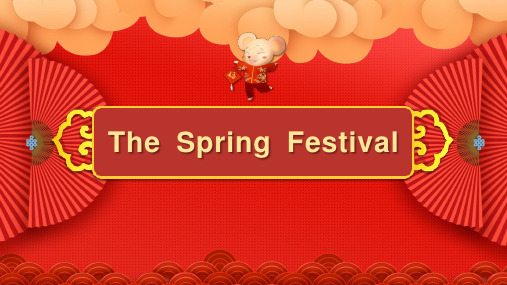
02 Customs of the Spring Festival
1. The spring festival transportation (春运)
提起春运,人们首先出现在脑海的印象就是人 多拥挤,票难买 When it comes to Spring Festival travel, the first thing that comes to mind is that people are crowded and tickets are hard to buy.
There are many legends about the origin of the Spring Festival. One legend goes that there was an extremely cruel beast named “Nian”, which had a very big mouth that would hurt people once a year on the new year eve. People were very scared.
In addition to pasting paper-cuts on windows, it is common for Chinese to paste the character “fu(福)”on walls or doors. “Fu” shows people’s yearning toward a good life. Some people even invert the character “fu” means "fu" arrive in Chinese.
3. Sweeping the Dust(扫尘)
“Dust” is homophonic with “chen”( 尘 )in Chinese , which means old and past. This custom shows a good wish of putting away old things to welcome a new life. Before the New Year comes, people will completely clean the inside and outside of their house.
用英语介绍春节的风俗简单
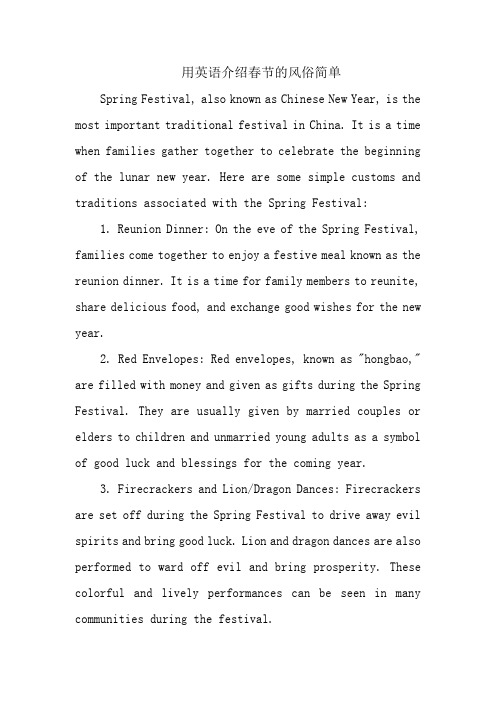
用英语介绍春节的风俗简单Spring Festival, also known as Chinese New Year, is the most important traditional festival in China. It is a time when families gather together to celebrate the beginning of the lunar new year. Here are some simple customs and traditions associated with the Spring Festival:1. Reunion Dinner: On the eve of the Spring Festival, families come together to enjoy a festive meal known as the reunion dinner. It is a time for family members to reunite, share delicious food, and exchange good wishes for the new year.2. Red Envelopes: Red envelopes, known as "hongbao," are filled with money and given as gifts during the Spring Festival. They are usually given by married couples or elders to children and unmarried young adults as a symbol of good luck and blessings for the coming year.3. Firecrackers and Lion/Dragon Dances: Firecrackers are set off during the Spring Festival to drive away evil spirits and bring good luck. Lion and dragon dances are also performed to ward off evil and bring prosperity. These colorful and lively performances can be seen in many communities during the festival.4. Decorations: Homes are decorated with red lanterns, couplets, and paper cuttings during the Spring Festival. Red is considered an auspicious color that symbolizes good fortune and joy. People also display images of the Chinese zodiac animal for the new year to bring luck and prosperity.5. Visiting Relatives and Friends: During the Spring Festival, it is customary to visit relatives and friends to exchange greetings and well wishes. This is a time for people to strengthen their social connections and maintain harmonious relationships.6. Traditional Clothing: Many people wear traditional Chinese clothing, such as the cheongsam or the traditional male attire known as the "changshan," during the Spring Festival. It adds to the festive atmosphere and showcases the rich cultural heritage of China.These are just a few examples of the customs and traditions associated with the Spring Festival. It is a time of joy, celebration, and renewal, marking the beginning of a new year filled with hope and auspiciousness.。
介绍春节习俗英语作文
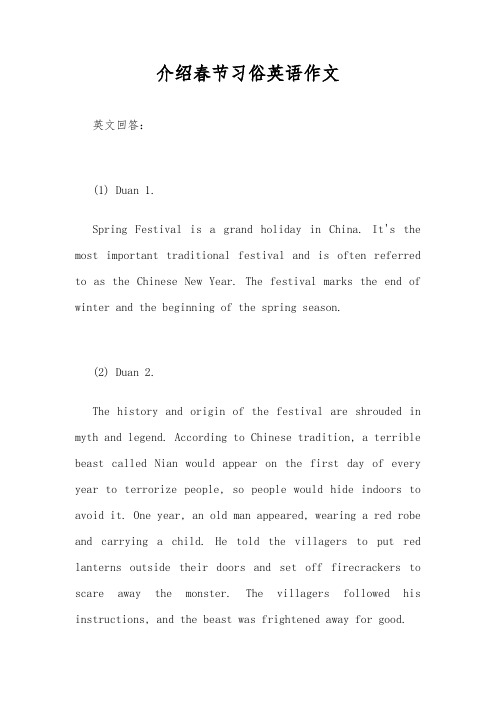
介绍春节习俗英语作文英文回答:(1) Duan 1.Spring Festival is a grand holiday in China. It's the most important traditional festival and is often referred to as the Chinese New Year. The festival marks the end of winter and the beginning of the spring season.(2) Duan 2.The history and origin of the festival are shrouded in myth and legend. According to Chinese tradition, a terrible beast called Nian would appear on the first day of every year to terrorize people, so people would hide indoors to avoid it. One year, an old man appeared, wearing a red robe and carrying a child. He told the villagers to put red lanterns outside their doors and set off firecrackers to scare away the monster. The villagers followed his instructions, and the beast was frightened away for good.(3) Duan 3.The Spring Festival is a public holiday in China, and it is celebrated over a period of 15 days. The festivities begin on the eve of the festival, with a family reunion dinner and the setting off of fireworks. On the first day of the festival, people visit their relatives and friends, exchange gifts, and enjoy a festive meal. The celebrations continue throughout the week, with various traditional activities, including lion and dragon dances, acrobatic shows, and the giving of red envelopes containing money.(4) Duan 4.The Spring Festival is a time for families to reunite and to celebrate the new year. It is also a time for reflection and renewal. The festival is a vibrant and colorful celebration that is full of joy and happiness. It is a time when people can come together and share the festive spirit.(5) Duan 5.The Spring Festival is a beautiful and meaningful holiday that is celebrated by people all over the world. It is a time to celebrate the Chinese culture and heritage, and it is a time to reflect on the past and to look forward to the future.中文回答:(1) 段落1春节是中国盛大的节日,它是最重要的传统节日,通常被称为中国新年。
春节习俗英语作文(精选23篇)
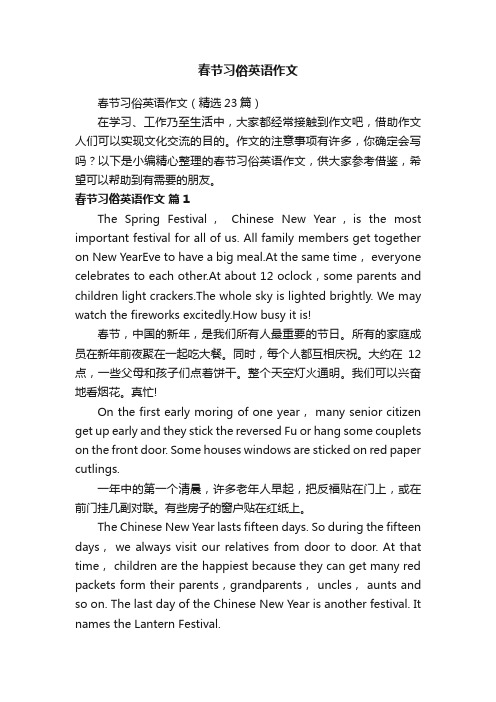
春节习俗英语作文春节习俗英语作文(精选23篇)在学习、工作乃至生活中,大家都经常接触到作文吧,借助作文人们可以实现文化交流的目的。
作文的注意事项有许多,你确定会写吗?以下是小编精心整理的春节习俗英语作文,供大家参考借鉴,希望可以帮助到有需要的朋友。
春节习俗英语作文篇1The Spring Festival,Chinese New Year,is the most important festival for all of us. All family members get together on New YearEve to have a big meal.At the same time, everyone celebrates to each other.At about 12 oclock,some parents and children light crackers.The whole sky is lighted brightly. We may watch the fireworks excitedly.How busy it is!春节,中国的新年,是我们所有人最重要的节日。
所有的家庭成员在新年前夜聚在一起吃大餐。
同时,每个人都互相庆祝。
大约在12点,一些父母和孩子们点着饼干。
整个天空灯火通明。
我们可以兴奋地看烟花。
真忙!On the first early moring of one year, many senior citizen get up early and they stick the reversed Fu or hang some couplets on the front door. Some houses windows are sticked on red paper cutlings.一年中的第一个清晨,许多老年人早起,把反福贴在门上,或在前门挂几副对联。
中国春节习俗英文介绍

中国春节习俗英文介绍中国春节有不少习俗,那你知道不同时期、不同地区、不同民族的习俗都不相同么?下面,小编为大家介绍一下中国春节习俗英文,欢迎大家阅读。
中国春节习俗英文介绍Spring Festival is a traditional festival in China and some Asian nations. Because legend has it that the beast is afraid of red, afraid of fire and afraid of sound, so people will have couplets, firecrackers, gongs and drums and other customs. Different periods, different regions, different ethnic customs are not the same.春节是中国及一些亚洲民族一个古老的传统节日。
因为相传年兽怕红色,怕火光和怕响声,所以人们便有贴春联、放鞭炮、敲锣打鼓等习俗。
不同时期、不同地区、不同民族的习俗都不相同。
In China, the Spring Festival is also a minority national peoples customs and festivals. People of all ethnic groups in accordance with their own customs, held a variety of celebration, with their strong national unique style. Spring Festival is an ancient festival in China. It is also one of the most important festival in the whole year. How to celebrate thisfestival, in the history of thousands of years, has formed some relatively fixed customs, there are still many people who have been handed down.在中国,春节也是少数民族人民的风俗节日。
有关春节习俗的英语作文精选【十篇】
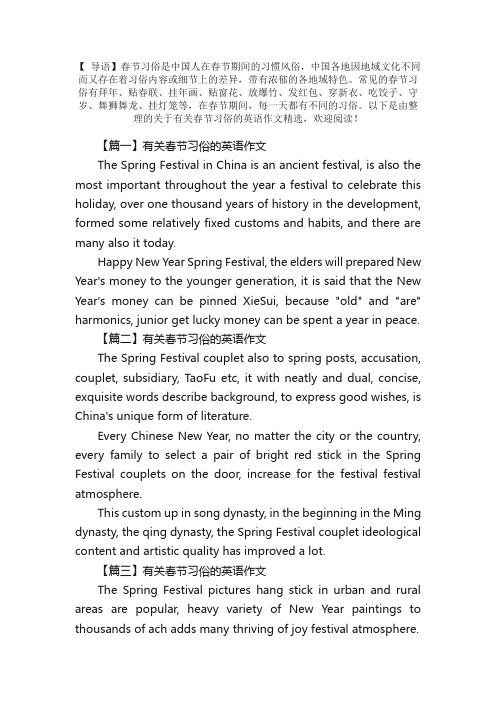
【导语】春节习俗是中国人在春节期间的习惯风俗,中国各地因地域文化不同而又存在着习俗内容或细节上的差异,带有浓郁的各地域特色。
常见的春节习俗有拜年、贴春联、挂年画、贴窗花、放爆竹、发红包、穿新衣、吃饺子、守岁、舞狮舞龙、挂灯笼等,在春节期间,每一天都有不同的习俗。
以下是由整理的关于有关春节习俗的英语作文精选,欢迎阅读!【篇一】有关春节习俗的英语作文The Spring Festival in China is an ancient festival, is also the most important throughout the year a festival to celebrate this holiday, over one thousand years of history in the development, formed some relatively fixed customs and habits, and there are many also it today.Happy New Year Spring Festival, the elders will prepared New Year's money to the younger generation, it is said that the New Year's money can be pinned XieSui, because "old" and "are" harmonics, junior get lucky money can be spent a year in peace.【篇二】有关春节习俗的英语作文The Spring Festival couplet also to spring posts, accusation, couplet, subsidiary, TaoFu etc, it with neatly and dual, concise, exquisite words describe background, to express good wishes, is China's unique form of literature.Every Chinese New Year, no matter the city or the country, every family to select a pair of bright red stick in the Spring Festival couplets on the door, increase for the festival festival atmosphere.This custom up in song dynasty, in the beginning in the Ming dynasty, the qing dynasty, the Spring Festival couplet ideological content and artistic quality has improved a lot.【篇三】有关春节习俗的英语作文The Spring Festival pictures hang stick in urban and rural areas are popular, heavy variety of New Year paintings to thousands of ach adds many thriving of joy festival atmosphere.New Year pictures is our country's an old folk art, reflect the people's simple customs and beliefs, entrusts they hope for the future.Pictures, also and the Spring Festival couplet, originated in the "door".【篇四】有关春节习俗的英语作文The New Year's eve ShouSui is the most important in one of the common activities, the common ShouSui has a long history.The earliest record of western weeks in place of the local record ": New Year's eve, giving each phase, known as the" age of feed ";Especially in wales, known as "don't years old"; Ancient ShouSui have two kinds of meanings: older people ShouSui for "of the old", have treasured time mean;【篇五】有关春节习俗的英语作文The Spring Festival is stuck "fu" character, is our country folk customs of has a long history. "F" word refers to the blessing, good fortune, showing the people to the happy life yearning, the wishes for a bright future.In order to fully reflect the yearning and wishes, some people simply will "fu" character topsy-turvy stick, said "happiness has to" "blessing has to".Folk and will "fu" character essence made all sorts of design of draw fine, design has the birthday girl, peach, carp jump the goal, the grain and multiply it, and ChengXiang dragon, etc.【篇六】有关春节习俗的英语作文The Spring Festival is the most important festival in China.People usually decorate the doors and windows with red papercuts.becouse red means good luck.People usually clean house too.becouse they want to sweep away bad luck.Childrencan get some new clothes or presents from their parents and grandparents.On New Year's Eve,family always have a big dinner.Everybody are watch TV and talk.In the midnight,there usually fairworks.On New Year's Day,people usually put on their new clothes and visit their femily and friends.They usually say Happy New Year's Day. The Spring Festival finishes at the Lantern Festival after two weeks.People usually eat a kind of rice dumpling called yuanxiao.It can take people good luck all the year round.【篇七】有关春节习俗的英语作文The spring Festival is coming soon! The festivel is considereded the most important one for Chinese people. It is on the first day of lunar year. It is also the day of reunion among family members. During these days, people would say "happy new year! or wish you make fortune! to each other. They would also visit their relatives and friends. Children would be given "red packets". Children would have more to eat and play than usual.Playing firecrackers is also a popular game for children.【篇八】有关春节习俗的英语作文China nation has a strong family concept and always have family reunion in some important days. Family Reunion Dinner is an essential custom on New Year's Eve. They usually enjoy a big feast this day. And dumpling and fish are must during the Family Reunion Dinner on New Year's Eve. Some people will put a coin inside one dumpling. The people who eat this dumpling will be to thought be a lucky guy. The fish could not be eaten out because the fish means extra things by partial tone. And it represents the wish for a prosperous year with abundant and even extra wealth and luck.【篇九】有关春节习俗的英语作文The Spring Festival is the most important festival in China.People usually decorate the doors and windows with red papercuts.becouse red means good luck.People usually clean house too.becouse they want to sweep away bad luck.Children can get some new clothes or presents from their parents and grandparents.【篇十】有关春节习俗的英语作文The Spring Festival is the most important festival for the Chinese people and is when all family members get together, just like Christmas in the West. All people living away from home go back, becoming the busiest time for transportation systems of about half a month from the Spring Festival. Airports, railway stations and long-distance bus stations are crowded with home returnees.During Spring Festival, the most improtant days are Spring Festival Eve and the first three days.Many customs accompany the Spring Festival.During Spring Festival time, you can see kinds of decorations.you can go to temple fairs and enjoy superb performances of the dances, stilt-walking and amazing acrobatic show s . s o i l i k e i t . / p > b r b d s f i d = " 1 8 1 " > p b d s f i d = " 1 8 2 " > / p > p b d s f i d = " 1 8 3 " > / p >。
春节习俗英语作文(精选40篇)

春节习俗英语作文春节习俗英语作文(精选40篇)在平平淡淡的日常中,大家总少不了接触作文吧,作文是一种言语活动,具有高度的综合性和创造性。
那要怎么写好作文呢?以下是小编为大家收集的春节习俗英语作文,欢迎阅读与收藏。
春节习俗英语作文篇1The lunar new year is a great occasion to the chinese people. it lasts aboutthe first four days of the year,during which people do not work except for theworkers on duty. students do not go to school,and shops are closed.several days before the new year,people begin to prepare. farmers killpigs,sheep,cocks and hens. city dwellers buy meat fish and vegetables. housesare cleaned; coupletsare posted on the doors. colourful lanterns are hung at thegate.On the eve of the new year,each family has its members gatherd together andeats a family reunion dinner. after the meal they watch tv until the clockstrickes twelve. then every family sets off long strings of small firecrackersand other fire works to welcome the new year. on the first day of the newyear,almost everyone is dressed in his or her best. when people meet on thewa y,they say to each other “happy new year”. friends and relatives pay new yearcalls and gives presents to each other. children indulge themselves ingames.春节习俗英语作文篇2Spring Festival is one of the most important festival in China.I spend the time with my family and relatives in Beijing, in which we do many activities. At the important time, we group together watching TV shows and enjoy every single second we are together. Normally, we play cards, cook food, hangout withfriends, play with firework, and develop good relationship with relatives.Without a doubt, Chinese spring festival is one of the most important festivals in China, which allow us to get our mind off the busy work and study.春节习俗英语作文篇3365 days a year, the most happy is the Spring Festival.Thirty I got up very early in the day. I went to the sitting room, mom and dad to get up early, is busy in the kitchen.I'm glad to run to the kitchen, with a beaming to say hello to your dad and mum: "how I met your mother, happy New Year, you were laborious!" So happy to see me, dad stopped, work cheerfully told me today's arrangement, mum is cooking by side kept nodding. Listen to the father said, I am very happy, really wish every points every second pass slowly, so I carefully taste the taste of the Chinese New Year春节习俗英语作文篇4Yesterday my mother and i went to the east lake about 40 kilometreseast of the city. i had a good time there.we left home at seven o'clock in the morning, and it took us about an hour to drive there. then we got to the lake. oh, how large the lake was!there were many green trees and red flowers around it. we got on a small boat and rowed it. the sky was clear and the breeze touched our faces softly. i sang while rowing the boat.after we had lunch in a small restaurant, we returned home.i really hope to go there next spring!春节习俗英语作文篇5The spring Festival is coming soon!The festivel is considereded the most important one for Chinese people.It is on the first day of lunar year. It is also the day of reunion among family members. During these days, people would say "happy new year! or wish you make fortune! to each other.They would also visit their relatives and friends. Children would be given "red packets". Children would have more to eat and play than usual.Playing firecrackers is also a popular game for children.春节习俗英语作文篇6In China,the Spring Festival in the most important festival.People usually have a long holiday.It lates seven days or of the families will have a big family get-together.The whole family will have a big meal on the eve of the Spring Festival.Everyone is happy.The most traditional food is dumplings.The Chinese think the dumplings will bring them good luck in the new the first day of the Chinese New Year,people usually wear new clothes and visit their relatives and friends.They say“Happy New Year”to each other.People often go to the parks or go shopping.春节习俗英语作文篇7Spring Festival is the most important festival in China. It's to celebrate the lunar calendar's New Year. In the evening before the Spring Festival, families get together and have a big meal.Children like the festival very much, because they can have delicious food, wear new clothes, and also get some lucky money from their parents.Parents want this money will bring good lucky to children. The Spring Festival lasts about 15 days long. People enjoy the Spring Festival, during this time they can have a good rest.春节习俗英语作文篇8Today is an annual Chinese New Year, the first day of the newyear,the traditional festival of China.At this day, everyone has a happy reunion , the families round together to eat regiment rice for year, is really a happy affair.Say for us, this festival is very happy, having a lot of delicious outside, can also take New Year's Money to buy the thing that oneself wants to buy for a long time.今天是一年一度的春节,也就是新年的第一天,中国的传统节日。
精选最新春节习俗的英语作文精选十篇
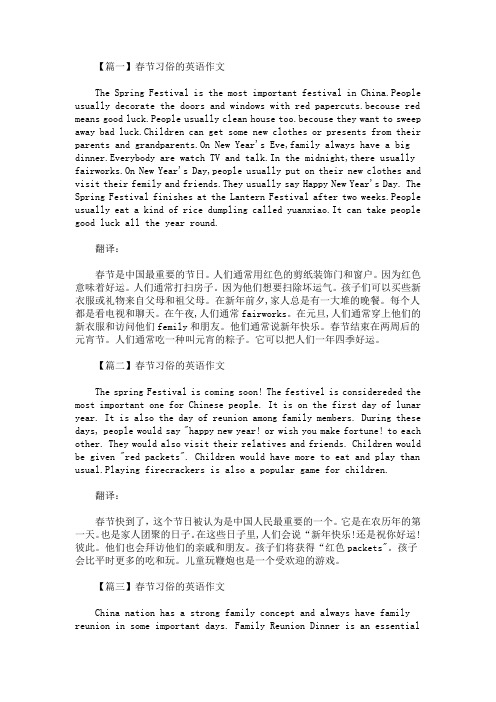
【篇一】春节习俗的英语作文The Spring Festival is the most important festival in China.People usually decorate the doors and windows with red papercuts.becouse red means good luck.People usually clean house too.becouse they want to sweep away bad luck.Children can get some new clothes or presents from their parents and grandparents.On New Year's Eve,family always have a big dinner.Everybody are watch TV and talk.In the midnight,there usually fairworks.On New Year's Day,people usually put on their new clothes and visit their femily and friends.They usually say Happy New Year's Day. The Spring Festival finishes at the Lantern Festival after two weeks.People usually eat a kind of rice dumpling called yuanxiao.It can take people good luck all the year round.翻译:春节是中国最重要的节日。
人们通常用红色的剪纸装饰门和窗户。
因为红色意味着好运。
人们通常打扫房子。
春节民俗英语素材
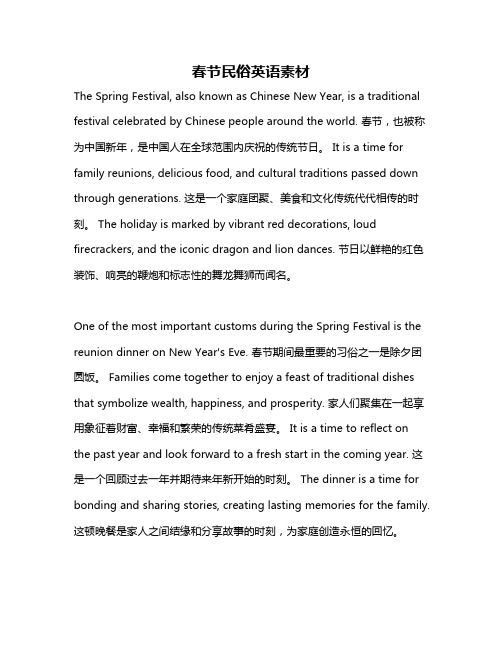
春节民俗英语素材The Spring Festival, also known as Chinese New Year, is a traditional festival celebrated by Chinese people around the world. 春节,也被称为中国新年,是中国人在全球范围内庆祝的传统节日。
It is a time for family reunions, delicious food, and cultural traditions passed down through generations. 这是一个家庭团聚、美食和文化传统代代相传的时刻。
The holiday is marked by vibrant red decorations, loud firecrackers, and the iconic dragon and lion dances. 节日以鲜艳的红色装饰、响亮的鞭炮和标志性的舞龙舞狮而闻名。
One of the most important customs during the Spring Festival is the reunion dinner on New Year's Eve. 春节期间最重要的习俗之一是除夕团圆饭。
Families come together to enjoy a feast of traditional dishes that symbolize wealth, happiness, and prosperity. 家人们聚集在一起享用象征着财富、幸福和繁荣的传统菜肴盛宴。
It is a time to reflect on the past year and look forward to a fresh start in the coming year. 这是一个回顾过去一年并期待来年新开始的时刻。
春节的习俗英文
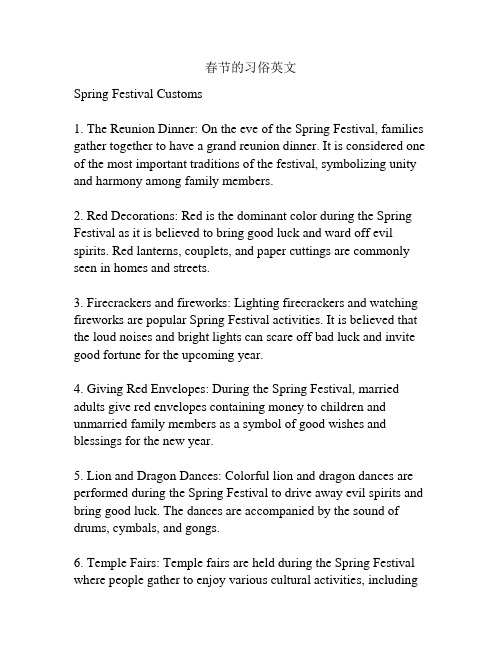
春节的习俗英文Spring Festival Customs1. The Reunion Dinner: On the eve of the Spring Festival, families gather together to have a grand reunion dinner. It is considered one of the most important traditions of the festival, symbolizing unity and harmony among family members.2. Red Decorations: Red is the dominant color during the Spring Festival as it is believed to bring good luck and ward off evil spirits. Red lanterns, couplets, and paper cuttings are commonly seen in homes and streets.3. Firecrackers and fireworks: Lighting firecrackers and watching fireworks are popular Spring Festival activities. It is believed that the loud noises and bright lights can scare off bad luck and invite good fortune for the upcoming year.4. Giving Red Envelopes: During the Spring Festival, married adults give red envelopes containing money to children and unmarried family members as a symbol of good wishes and blessings for the new year.5. Lion and Dragon Dances: Colorful lion and dragon dances are performed during the Spring Festival to drive away evil spirits and bring good luck. The dances are accompanied by the sound of drums, cymbals, and gongs.6. Temple Fairs: Temple fairs are held during the Spring Festival where people gather to enjoy various cultural activities, includingtraditional performances, games, and local delicacies. It is a festive and lively atmosphere.7. Making Dumplings: Making dumplings is a common tradition during the Spring Festival, symbolizing wealth and auspiciousness. Family members come together to make dumplings filled with various ingredients and enjoy them as a special treat.8. Spring Couplets: Red banners known as spring couplets are hung on doors and walls, usually with poetic verses that express good fortune and positive wishes for the new year.9. New Year's Eve Gala: On the eve of the Spring Festival, families often watch the New Year's Eve Gala on television. This grand show features various performances, including traditional music, dances, and comedy sketches.10. Visiting Relatives and Friends: It is customary to visit relatives and friends during the Spring Festival, exchanging greetings and wishes for a prosperous year. This is an opportunity to strengthen bonds and foster social connections.。
春节的风俗英语简短句子

春节的风俗英语简短句子春节是中国人最盛大的传统节日之一。
以下是一些关于春节风俗的英语简短句子,希望可以让你更了解这个传统节日。
1.Spring Festival, also known as Chinese New Year, isthe most important traditional festival in China.2.Red lanterns are a symbol of good luck andhappiness during the Spring Festival.3.Families reunite to have a big reunion dinner on theeve of the Chinese New Year.4.Giving red envelopes filled with money to children isa common practice during the Spring Festival.5.Firecrackers are set off to scare away evil spirits andwelcome the new year.6.People decorate their homes with paper-cuttingsand couplets for good fortune.7.Lion and dragon dances are performed to bring luckand prosperity in the new year.8.Making dumplings is a popular activity for familiesduring the Spring Festival.9.The festival lasts for 15 days, with the LanternFestival marking the end of the celebrations.10.Wearing new clothes and cleaning the house beforethe new year symbolize a fresh start and renewal.11.Visiting relatives and friends to exchange greetingsand blessings is a tradition during the Chinese New Year.12.Eating traditional foods like fish, dumplings, and rice cakes are believed to bring good luck and prosperity in the new year.13.The sound of fireworks and the sight of red decorations are ubiquitous during the Spring Festival celebrations.14.Traditional performances like the Beijing Opera and the lion dance are popular entertainment during the Chinese New Year.15.The Spring Festival is a time for families to come together, cherish traditions, and look forward to a prosperous new year.。
春节英语手抄报内容中英文素材

春节英语手抄报内容中英文素材以下是一些关于春节的英文手抄报内容中英文素材,包括春节的起源、传统习俗和祝福语等。
春节的起源:The Spring Festival is the most important traditional holiday in China, which falls on the first day of the lunar new year. It is also known as the Chinese New Year. The origin of the Spring Festival is linked to the legend of Nian, a fierce beast that used to terrorize the people. The beast was eventually subdued by red paper cutouts and fireworks, which are now used to celebrate the festival.春节的传统习俗:The Spring Festival is celebrated with various traditional customs, including cleaning the house to sweep away bad luck, giving red envelopes to children as gifts, setting off fireworks and watching dragon and lion dances. During the festival, people also enjoy delicious meals, especially dishes that symbolize good luck and prosperity, such as fish and dumplings.春节的祝福语:People often use祝福语 to express their good wishes during the Spring Festival. Some common 祝福语 include "新年快乐" (HappyNew Year), "万事如意" (All wishes come true), "身体健康" (Good health) and "恭喜发财" (Wishing you prosperity).在春节期间,人们还会贴春联,这是一种用红纸写成的对联,通常挂在门上。
春节的风俗英语简短

春节的风俗英语简短春节的风俗有这些英文:Buy new year goods买年货;paste Spring Festival couplets贴春联;cut window flowers剪窗花;ang New Year pictures挂年画;new year's Eve dinner年夜饭;Lucky money压岁钱;keep the year old守岁;eat dumplings吃饺子;set off firecrackers放鞭炮;watch the Spring Festival Gala看春晚。
What are the customs of Spring Festival?节的风俗有哪些?Buy new year goods买年货:Chinese people have always regarded the new year as a major event for thousands of years.Before the Spring Festival,we have to make a lot of preparations and buy a lot of things,includingfood,use,wear,wear,play,supply,dry,fresh,raw,cooked,etc.The common name is"new year goods".翻译:中国人几千年来总把过年当作件大事。
过年之前要做很多准备,要买很多东西,有吃的、用的、穿的、戴的、耍的、供的、干的、鲜的、生的、熟的等。
统名之曰“年货”。
paste Spring Festival couplets贴春联:Spring Festival couplets,also known as"spring stickers","couplets"and"door pairs",are a unique literary form in China and an important symbol for Chinese people to celebrate the Spring Festival.It depicts beautiful images and expresses good wishes with neat,concise and exquisite words.翻译:春联,又叫“春贴”“对联”“门对”,是中国特有的文学形式,也是华人们过春节的重要标志。
春节的传统文化和风俗英文带中文注释

春节的传统文化和风俗英文带中文注释春节的传统文化和风俗英文带中文注释:Spring FestivalSpring Festival, also known as Chinese New Year, is one of the most significant traditional festivals in China, embodying rich cultural traditions and unique customs.1. Spring Festival Eve Dinner (Nianye Fan)On the eve of Spring Festival, families gather together to have a reunion dinner, known as Nianye Fan. This meal is considered auspicious and symbolic, often including dishes such as fish (representing abundance and prosperity) and spring rolls (symbolizing wealth and good luck).中文注释:春节前夕,家人会聚在一起吃团圆饭,即年夜饭。
这顿饭寓意吉祥,常包括鱼(代表富足和繁荣)和春卷(象征财富和好运)等菜肴。
2. Giving Red Envelopes (Hongbao)During the Spring Festival, elders often give red envelopes, known as Hongbao, to children and unmarried young adults as a symbol of good luck and a blessing for the new year.These envelopes usually contain money, which is believed to bring prosperity and happiness.中文注释:春节期间,长辈通常会给孩子和未婚的年轻人发红包,作为好运和新年祝福的象征。
- 1、下载文档前请自行甄别文档内容的完整性,平台不提供额外的编辑、内容补充、找答案等附加服务。
- 2、"仅部分预览"的文档,不可在线预览部分如存在完整性等问题,可反馈申请退款(可完整预览的文档不适用该条件!)。
- 3、如文档侵犯您的权益,请联系客服反馈,我们会尽快为您处理(人工客服工作时间:9:00-18:30)。
关于春节习俗的英语素材
导语:春节是中国传统节日,下面是yuwenmiWTT为大家整理的优秀英语作文素材,欢迎阅读与借鉴,谢谢!
The Spring Couplet, also called “couplet” and “a pair of antithetical phrases”, is a special form of literature in China、 The Spring Couplet is composed of two antithetical sentences on both sides of the door and a horizontal scroll bearing an inscriiption, usually an auspicious phrase, above the gate、 The sentence pasting on the right side of the door is called the first line of the couplet and the one on the left the second line、 On the eve of the Spring Festival, every household will paste on doors a spring couplet written on red paper to give a happy and prosperous atmosphere of the Festival、In the past, the Chinese usually wrote their own spring couplet with a brush or asked others to do for them, while nowadays, it is common for people to buy the
printed spring couplet in the market、
“春联”也被称为和“对联”对立的一对短语,在中国是一种特殊的文学形式。
春联是由贴在门口两侧两组对立的句子组成,在门上面的横批通常是一个吉祥的短语。
贴在门右侧的句子
被称作对联的上联,左侧的为下联。
除夕那天,每家都会在门上贴上红纸写的春联,传递出节日喜庆和热闹的气氛。
在过去,中国人通常用毛笔自己写春联或者请别人写春联,而现在,人们普遍在市场上买印刷好的春联。
Set off firecrackers 放鞭炮的英语介绍:
The firecracker is a unique product in China、 In ancient China, the sound of burning bamboo tubes was used to scare away wild animals and evil spirits、 With the invention of the gunpowder, “firecracker” is also called “鞭炮biānpào” (“炮” in Chinese means gun) and used to foster a joyful atmosphere、 The first thing every Chinese household does is to set off firecrackers and fireworks, which are meant to bid farewell to the old year and usher in the new、 In the past few years, such an activity was completely or partially forbidden in big cities including Beijing due to fire and personal casualty caused by burning firecrackers、 However, some Chinese thought that a Spring Festival without firecrackers was not lively enough and they burned firecrackers by stealth、 So in recent years, the ban was canceled again、 This shows
that burning firecrackers is a very important activity during the Spring Festival、
Sweeping the dust扫尘的英语介绍中英对照:
“Dust” is homophonic with “chen”(尘)in Chinese, which means old and past、In this way, “sweeping the dust” before the Spring Festival means a thorough cleaning of houses to sweep away bad luck in the past year、 This custom shows a good wish of putting away old things to welcome a new life、 In a word, just before the Spring Festival comes, every household will give a thorough cleaning to bid farewell to the old year and usher in the new、
“Dust”与“尘”是谐音(尘在汉语中的意思是旧的和过去的)。
这样,“在春节前扫尘”是指彻底清洁房屋扫除过去一年的厄运。
此习俗表达了收拾旧事物,欢迎新生活的美好愿望。
总之,就在春节到来之前,为了告别旧年迎接新年,家家户户都会彻底打扫一下房屋。
